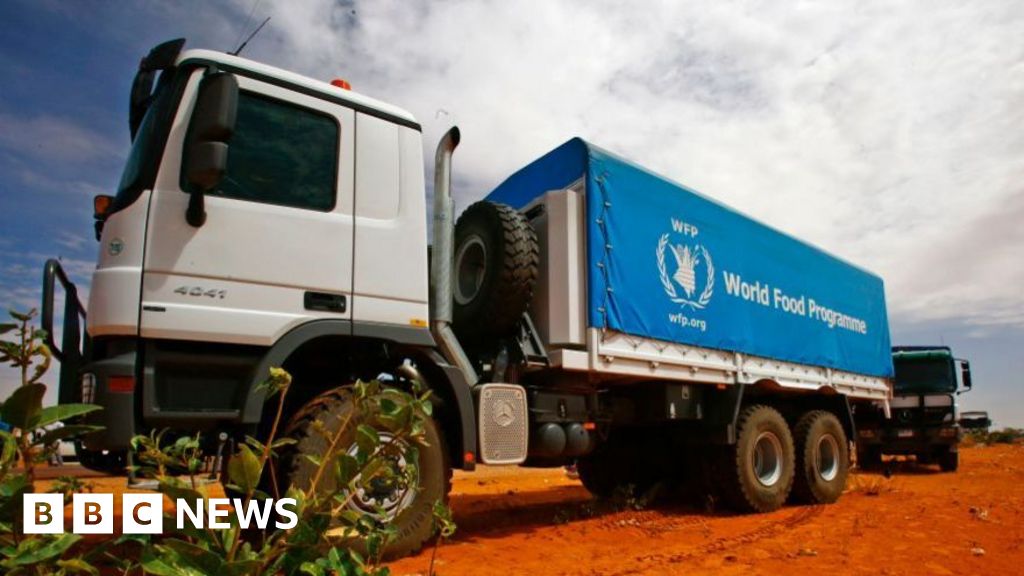Sudan's army denies bombing convoy taking aid to famine-hit area

Sudan Army Denies Bombing Aid Convoy En Route to Famine-Hit Darfur
Sudan's army has refuted claims that it bombed a World Food Programme (WFP) convoy carrying vital aid to a famine-stricken area in the Darfur region. The denial comes after the paramilitary Rapid Support Forces (RSF) accused the army of conducting an airstrike in Mellit, a town currently under RSF control, on Wednesday. The incident underscores the perilous conditions facing humanitarian operations amidst the ongoing civil war.
The WFP confirmed the attack, stating that three lorries within the 16-vehicle convoy were damaged and caught fire. While no staff members were injured, the incident has raised serious concerns about the safety and security of aid workers operating in the conflict zone. The convoy was destined for a village near Mellit, approximately 90km northwest of El-Fasher, a region grappling with severe food shortages.
Escalating Conflict and Humanitarian Crisis
Sudan has been embroiled in a brutal civil war since April 2023, sparked by a power struggle between the army, led by General Abdel Fattah al-Burhan, and the RSF, commanded by General Mohamed Hamdan Dagalo. The conflict has triggered one of the world's worst humanitarian crises, displacing millions and leaving vast swathes of the population facing starvation.
The RSF, lacking its own air force, has blamed the army for the Mellit airstrike. Both sides have been known to deploy drones in the conflict. The attack on the WFP convoy marks the latest in a series of assaults targeting humanitarian operations in Sudan, hindering efforts to deliver desperately needed assistance to vulnerable populations.
WFP Condemnation and Calls for Protection
"Humanitarian staff and assets must never be a target," the WFP stated emphatically, urging both warring parties to adhere to international humanitarian law. The organization is currently gathering further information and assessing the overall impact of the recent attack. Securing safe and unimpeded access for humanitarian actors is paramount to averting further catastrophe, the WFP stressed.
El-Fasher Under Siege
El-Fasher, the army's last stronghold in the Darfur region, has been under siege by the RSF for over a year. The city has become a focal point of the conflict, with the RSF intensifying its efforts to seize control in recent weeks. The fighting has severely disrupted supply routes and hampered humanitarian access, exacerbating the already dire situation for civilians trapped in the crossfire.
Accusations of Starvation as a Weapon of War
Both the army and the RSF have been repeatedly accused of employing starvation as a weapon of war by obstructing aid deliveries and looting food supplies. These actions have deliberately deprived civilians of essential resources, further compounding the suffering caused by the conflict. In June, five aid workers were killed in a similar attack in El-Fasher, highlighting the extreme dangers faced by those attempting to provide assistance.
Expert Analysis: A Deliberate Strategy?
Dr. Khadija Ahmed, a Sudan analyst at the University of Khartoum, suggests that the attacks on aid convoys are not isolated incidents, but rather a deliberate strategy by both sides to weaken their opponents by controlling access to resources. "By disrupting aid flows, the warring parties aim to exert control over the population and undermine the legitimacy of their rivals," she explains. "This tactic is particularly devastating in regions like Darfur, where communities are already facing severe food insecurity."
A Nation in Crisis: Displacement and Death
The conflict has resulted in the deaths of tens of thousands of people and forced an estimated 12 million to flee their homes. Over 4.5 million refugees, predominantly women and children, have sought refuge in neighboring countries, placing immense strain on already stretched resources.
According to Amnesty International's Africa Director, Tigere Chagutah, "The deliberate targeting of humanitarian aid is a war crime. There needs to be urgent and impartial investigation into these incidents and accountability for those responsible."
The situation in Sudan remains critical, with the need for sustained humanitarian assistance and a peaceful resolution to the conflict more urgent than ever. The international community is under increasing pressure to step up its efforts to protect civilians, ensure access to aid, and hold those responsible for atrocities accountable.
Originally sourced from: BBC News Africa
